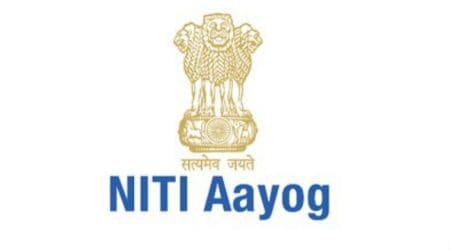 Niti Ayog building in New Delhi. (File photo)
Niti Ayog building in New Delhi. (File photo)
The NITI Aayog, in a letter written to the Department of Economic Affairs (DEA) and the HRD Ministry last month, has called for amendments to a batch of laws and regulations that it describes as “restrictive” to private investment in higher education. These include Section 8 of The Companies Act, 2013; Section 10(n) of the AICTE Act 1987; paragraph 2.1 of the University Grants Commission (UGC) regulation on maintenance of standards in private universities and paragraph 5.1 of UGC’s deemed university regulations.
The letter by NITI Aayog CEO Amitabh Kant, dated August 7, has drawn DEA Secretary Subhash C Garg and Higher Education Secretary K K Sharma’s attention to these provisions and states that these require suitable changes which need to be spearheaded by the HRD Ministry. Section 10(n) of AICTE Act, for example, gives AICTE the powers to take all steps to prevent commercialisation of technical education. Paragraph 5.1 of UGC’s deemed university regulations states that all deemed-to-be universities shall be registered as a not-for-profit society under the Societies Registration Act, 1860 or as a not-for-profit Trust under the Public Trust Act, or as a not-for-profit company under Section 8 of the Companies Act, 2013.
Similarly, paragraph 2.1 of UGC (Establishment of ad Maintenance of Standards in Private Universities) Regulations define a private university as one established through a state/central Act by a sponsoring body which is either a not-for-profit society or company.
Sources said Kant’s letter was in response to a note written by Garg to HRD in the last week of June, a copy of which was marked to the Department of Industrial Policy and Promotion and NITI Aayog, calling for review of the investment policy in education in India. “The communication drew attention to the large number of Indian students going abroad for higher studies. It also said there is a need to review our current policies and find out why there is little foreign investment in education in India,” said a source.
When contacted, Kant declined to comment.
“Our existing policy framework doesn’t encourage any world-class institutions to set up campuses in India. Similarly, the not-for-profit provisions encourage (private) institutions to make money under the table. The fact is that these are outdated provisions restricting private investment. DEA agrees with NITI’s view,” said the source who did not wish to be identified.
When contacted, Secretary Sharma said: “We are actively engaged in bringing various reforms in education.The government has recently approved regulatory architecture for setting up world-class institutions. This is major step to attract private investment in higher education. Foreign investment is also allowed (at this moment); any changes in existing policy will require further examination.”
Over the years, the Supreme Court has interpreted the nature of educational institutions in India to be charitable and not for profit. If an institution generates any surplus, it cannot plough back the surplus to invest elsewhere. It has to be reinvested in the same institute. That apart, India lacks a legal framework to allow foreign educational institutions to set up campuses. Although players abroad are allowed to enter the Indian education sector, investment can only be done through a not-for-profit entity registered as a society or trust or Section 8 company.
The UPA government had made two unsuccessful attempts to allow foreign campuses in the country but the Bill couldn’t pass political muster in Parliament. The Bill proposed significantly lower regulatory oversight over foreign universities as compared to their Indian counterparts, but barred them from repatriating any surplus generated.

